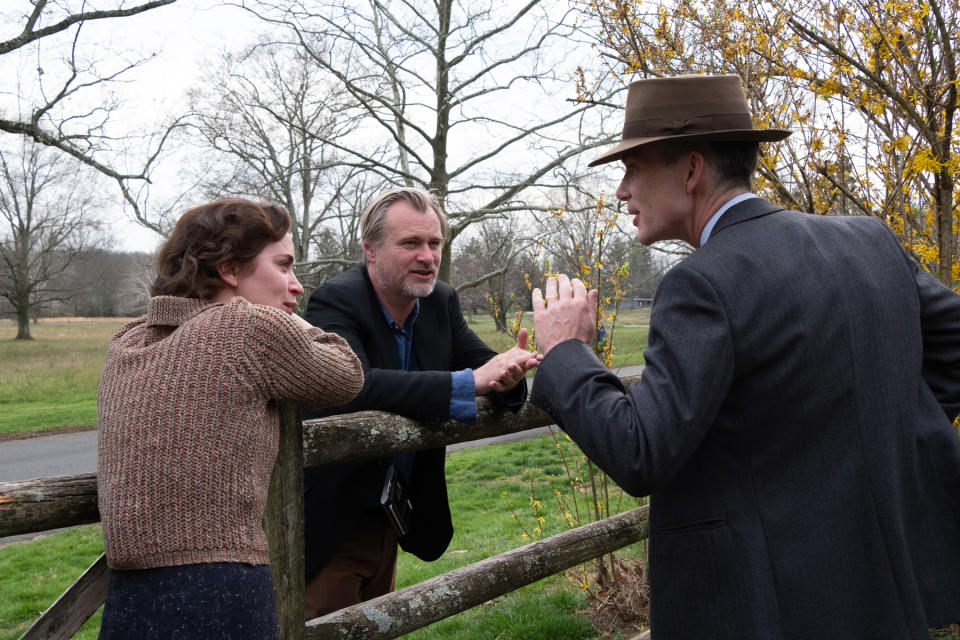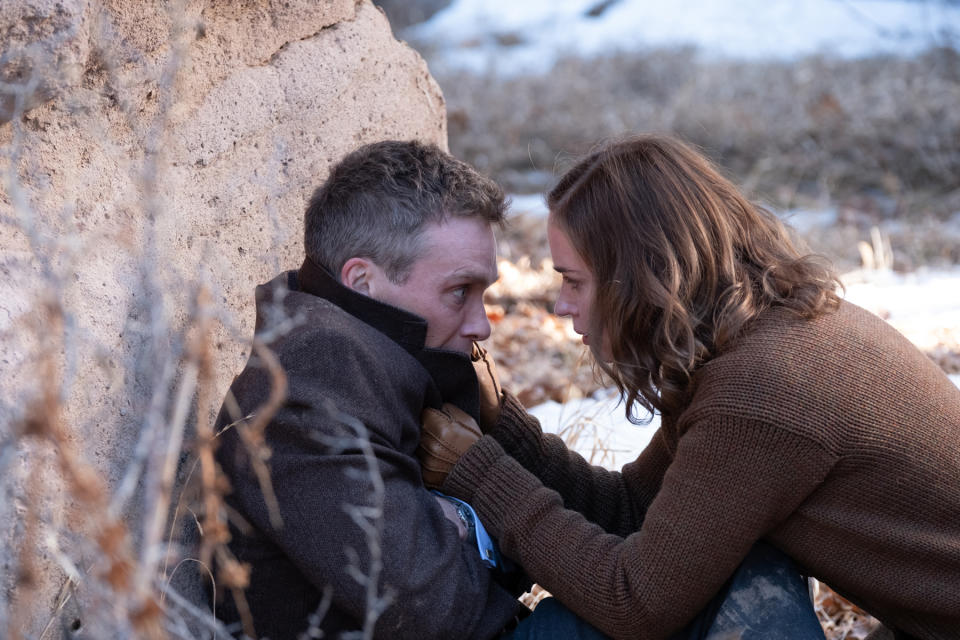‘She’s Abrasive — and I Loved Her.’ Emily Blunt on Her ‘Oppenheimer’ Role
- Oops!Something went wrong.Please try again later.
- Oops!Something went wrong.Please try again later.
- Oops!Something went wrong.Please try again later.

Emily Blunt is laughing. Talk to the actor for any given amount of time — it could be six hours, might be six minutes — and you’ll hear her do this a lot. She’s a full-body laugher, not the snorting, shaking-fits kind but the pitching-about type, as if she was trying to remain steady on a ship that just hit rough waves. A lean-back laugher. Several times during a conversation on Zoom, the Oscar-nominated star will come close to inadvertently exiting the frame when she finds something extremely funny.
The only thing Blunt seems to do more naturally than laugh is slip into voices, and in the middle of answering a question or telling an anecdote, she’s suddenly dropping into a flawless imitation of Christopher Nolan’s clipped, authoritative British baritone. A little later, she’ll recall respective moments on sets in the purring Irish brogue of her friend and fellow Academy class-of-’24 nominee Cillian Murphy and the grumbling Polish accent of filmmaker Pawel Pawlikoski, who directed Blunt in her breakthrough 2004 movie My Summer of Love. One of her kids’ teachers in Brooklyn, where she and her husband, John Krasinski, and their family live, is channeled for an audio cameo. (“He rode by on his bike and yelled, ‘Hey, con-graaaat-ulations on the award thing!'”) So are a number of posh, prim English types who sound like a cross between Queen Victoria and Mary Poppins — not surprising, given that Blunt has played both roles during her 20-year career, yet still odd to hear in the context of a casual chat.
More from Rolling Stone
See 'The Devil Wears Prada' Stars Reunite Onstage at the SAG Awards
John Cena's Agents Resisted Making Him a Merman in 'Barbie': 'This Is Beneath You'
Mark Ronson Says Greta Gerwig Asked for the 'Most Maximalist Thing' on 'I'm Just Ken'
Then, in between laughs and impersonations and a one-woman show’s worth of characters, she’s asked about a specific scene in Oppenheimer, Nolan’s epic biography about the nuclear physicist and political martyr and the man who would be destroyer of worlds. And while illustrating a point, Blunt repeats a line from the film in Kitty Oppenheimer’s whispery voice. The effect is not just startling. It’s haunting. The actor is onscreen for less than 17 minutes in this three-hour drama filled with several dozen speaking parts, yet the impression she makes on viewers via this stifled, somewhat broken woman is more than just lasting. It defines the personal stakes in a movie about humanity’s march toward existential self-destruction. You feel like her Kitty is constantly bearing down on pressure points whenever she’s talking to someone, whether it’s her husband or those that would hurt him. Even her support of her spouse at his lowest moments reads as tough love. The result is the sort of performance that suggests a whole other movie happening within and causing ripples throughout Nolan’s bigger picture.

“The first time I read the script, my impulse was to go: She’s so abrasive,” Blunt says. “She’s so nasty. The men at Los Alamos were intimidated by her; one of the other wives there was quoted as saying, ‘She’s the most evil person I’ve ever met.’ Kitty didn’t want to do the sewing clubs and the tea parties. She would throw dinner parties where the only courses were martinis and cigarettes. She scared people, and I think that was by design.
“And yet,” Blunt says, carefully emphasizing that conjunction, “I also loved her when I read through those scenes Chris had written as well. Because you could clearly see the ‘why’ of it all — the frustration, the intelligence, the simmering rage of that brilliant brain just deteriorating as she tried to pretzel herself into the role of the perfect housewife. She was somehow this stabilizing force in Robert Oppenheimer’s life while being a completely unstable person overall. I’ve said this before, but Kitty was the full weather system of a person, and I’m attracted to playing someone for whom the shadow of their life is complicated, you know? She was abrasive. And she’s also probably the most honest person in the film.”
In real life, Kitty Puening was a German biologist, a former member of the Communist Party, and was in the middle of her second marriage when she met the future creator of the atomic bomb at a party in Pasadena, California, in 1939. That’s when the audience is formally introduced to her as well, as we watch Oppenheimer fix a flirtatious Kitty a drink and explain quantum physics to her. Cut to the two of them horseback riding in the New Mexico countryside, clearly smitten with each other. Nolan’s film crisscrosses back and forth between chronologies and timelines, so by the third time we see Kitty, she’s already Mrs. Oppenheimer, has given birth to their son Peter, and isn’t exactly in a state of domestic bliss. In three quick sequences, Blunt has already given us a rough sketch of who this person is: a world traveler with a lot of life experience under her belt, a bruised romantic, and a woman on the verge of a nervous breakdown.
Kitty was also a notorious drinker, an element which Oppenheimer doesn’t shy away from, and it was up to Blunt to determine how far to push that third moment — a late-night confrontation that ends with her stumbling away with a half-full bottle of booze — as well as numerous other scenes in which she speaks her mind while somewhat soused.
“I didn’t want to demean or offend anyone who’s struggled with alcohol problems,” Blunt says. “I also didn’t want that to be the one defining characteristic of her either. I didn’t want her to be seen as a mean drunk because, at a certain point, when the government is going after them, Kitty isn’t trying to be cruel. She’s just the only person who sees things for what they are. She’s a ruthless truth-teller, and those scenes were more about how her inhibitions are just gone. There’s definitely the springboard of her being a few in, which allows her to be direct in a messy, filterless sort of way.
“Chris was always interested in the whole spectrum, how the syncopation of what you were doing meant that it could mean more than one thing,” she continues. “He would encourage you to do a take that was slightly straitjacketed, then try one where you just rip the other person’s face off. Even the scene where I throw a bottle at Cillian’s head — there were different levels of rage, different levels of restraint, different levels of drunk. With those scenes… I was more interested in the quiet desperation of someone who drinks like that rather than just, you know, staggering around.”
“Do you remember the scene where Kitty is walking in to be interrogated by the committee?” Cillian Murphy asks, calling from Berlin a few days after Blunt has mentioned her preference for calibrating her character’s levels of inebriation. “I’m waiting for her at the end of this hallway, it’s right before a hearing, and as she’s walking, Emily just slightly tips forward on her heels. It’s the tiniest thing, but enough that you catch it and you think, ‘Oh, she’s had a few. This is not going to go well.’ She would add things like that all of the time, these little touches that tell you exactly what you need to know. It’s exactly what you want from another actor. When we were doing those scenes, there would be new stuff she’d throw at you every time.
“I don’t know if anyone’s said this before,” Murphy adds, “but I really do think she’s the Meryl Streep of her generation. Because Streep is an actor who has this incredible range, but she’s always surprising you with her choices. And that’s Emily. There really is this, ‘Oh, there’s nothing you can’t do, is there?’ feeling when you’re in a scene with her.”

Blunt and Murphy had worked together previously on A Quiet Place: Part II and became close friends, which both admit helped them establish the particular marital dynamic between Robert and Kitty. She says she was surprised to find out that they both have a similar prep process (“I’ll go off by myself and sort of wander around an empty house, walking around and muttering lines out loud for a few days — which it turns out is exactly what Cillian did for this film as well”). He singles out the sequence in which Kitty finds him in the woods, grieving the death of a lover, and admits that he probably could not have gone to where he needed to go at that moment without having her as a scene partner. Both have become a two-person mutual admiration society as they’ve been on the awards circuit. “I mean, I could talk about Cillian all day long; I absolutely adore him,” she says before mock-growling, “and he better be reciprocating that shit!”
And both single out the exchange between Kitty and the attorney Roger Robb, played by Jason Clarke, as one of those days working together where, per Blunt, “the air just shifts. There was a palpable vibration in the room when we were playing it. I remember that Jason asked to move his chair closer to Kitty, which became this shorthand for the character, making this toxic-masculinity power move and going, Right. This is how it starts. We let the rat-a-tat-tat feel of the interview dictate the rhythm, and then there’s a moment where Kitty just activates. From there, it was about her just wallowing in her ability to dismantle and humiliate a bully. You see her reclaim that brilliant brain of her right then and there.”
“I was sitting behind her, so I couldn’t watch her,” Murphy recalls. “I never saw the look on her face or her reactions until I saw the scene in the film. But I could completely hear what was happening as she was doing it. There’s such a musicality to the way Emily builds things up in that takedown that I can remember listening to her saying those lines it and thinking, she’s turning this around. She’s become this force. It was breathtaking.”
It’s likely that Blunt’s verbal deathblow of “It’s your question, it’s not properly phrased” will be part of the clip they play when the Oscar contenders for Best Supporting Actress are read from the stage of the Kodak theater on March 10th. Most people were surprised that this was her first Academy Award nomination. Blunt herself was shocked by how moved she felt when she heard her name announced this past January. “I’ve never strategized choices based solely on awards, clearly,” she says. (Two days after the ceremony, Blunt will premiere The Fall Guy at SXSW, an action-comedy based on the ’80s TV show and is the polar opposite of a quote-unquote awards movie.) “But it really has become this emotional thing where people from all of these stages of my career have reached out to congratulate me, and… I don’t know, I’ve pretty much just felt lighter since it happened.”
Her entire experience with Oppenheimer has been unique from the very start, however, from the film’s London premiere — in which she and the cast, in a co-ordinated move, left after the red carpet in solidarity with SAG calling a strike during the event — to the whole Barbenheimer thing. Since she began acting onscreen in the late 1990s, Blunt has been in cult sci-fi blockbusters and heavily quoted hits and thrillers that get her recognized in airports. (“Every time I go through passport control, someone mentions Sicario. TSA, DEA, CIA, Special Forces — you’d be surprised how popular that movie is with all types of law enforcement.”) She’s done prestigious costume dramas and Disney films and the sort of popcorn movies she grew up watching as a kid.
Yet there’s something about this particular project, she’s quick to mention, that feels special in a way beyond simply the recognition of her peers and the recounting of a great American tragedy. During her recent FYC Q&As and talk-show appearances, Blunt has been telling the story of how she and her husband found an IMAX theater in Nyack, NY, that was playing the film, slipped in to see their seats before the lights went down, and then watched as a gaggle of teenagers came in dressed as Robert Oppenheimer, pipes and all. Even knowing that this meme-friendly cosplay had sprung from what was essentially a joke about a disparate double feature that become a pop cultural phenomenon, she still found herself amazed by it.
“I just love the anomalies of life,” Blunt says. “I mean, no one expected a three-hour, super-intense drama about the life of the father of the atomic bomb to do what it did or make the impact it has. So, for me, it’s like: If we keep making anomalies, we keep making rare movies. And that’s what I like.” She suddenly adopts the voice of someone who’s had their mind blown. “Just make anomalies, Emily. That’s the secret!” And for the 110th time since she started talking on this Zoom, she lets out a long laugh.
Best of Rolling Stone

